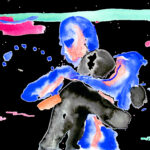When embarking on the journey of learning French, many find themselves captivated by the allure of its romantic reputation. But beyond the whispered “je t’aime”, What Is Love In French? It’s a question that delves deeper than simple translation, inviting us to explore the nuances of culture, emotion, and connection through the elegant lens of the French language.
My own foray into French began, much like many others, with a mix of excitement and daunting challenges. As a high school freshman, the initial months were marked by a profound sense of inadequacy. The melodic sounds felt foreign, the grammar perplexing. Like many American students, I wrestled with self-doubt, even questioning my ability to grasp this new linguistic world. French verbs like être and avoir, foundational as they were, seemed determined to remain elusive, tangled in my Southern Californian accent. The very concept of gendered nouns felt utterly bizarre, a stark contrast to the more straightforward structure of English.
This initial struggle, I came to realize, wasn’t just personal. There’s a broader cultural context at play in the United States, where multilingualism isn’t always celebrated. Perhaps this stems from historical anxieties or a misguided notion of egalitarianism, but the result is that foreign language learning is often treated as a hurdle to overcome rather than a rich experience to embrace. Unlike in many parts of Europe where multilingualism is the norm, American teenagers rarely achieve fluency in languages beyond English.
During those early months, French class felt like navigating an alien landscape. I dreaded being called upon, fearing the inevitable mispronunciations and grammatical stumbles. Even the teacher’s attempts to make learning fun, like singing French songs from musicals, felt more like torture than encouragement.
Yet, a turning point arrived unexpectedly, sparked by an encounter with French cinema. Our teacher, Madame K, introduced us to François Truffaut’s The 400 Blows (Les Quatre Cents Coups). Initially, the title itself, with its suggestive sound to American ears, caused giggles. But Madame K patiently explained the idiomatic meaning – “to raise hell” – and introduced us to the world of French New Wave cinema.
I confess, at that age, black and white films seemed far from appealing. But The 400 Blows was different. While classmates might have been indifferent, I was mesmerized. The film’s portrayal of teenage rebellion in 1950s Paris, against the backdrop of stunning cityscapes, resonated deeply. Here was something French that transcended textbooks and grammar drills; it was raw, emotional, and utterly captivating.
Madame K’s choice was astute. Showing us a film where the protagonist defied authority, skipped school, and ultimately sought escape, was a stroke of brilliance. Suddenly, French wasn’t just about conjugations; it was a gateway to a different world, a different perspective. It was, in essence, a form of rebellion against the mundane, and in that rebellion, I found my coup de foudre – my love at first sight – with the French language and culture.
Inspired, I sought out the sequels to The 400 Blows, immersing myself in Antoine Doinel’s cinematic journey through adolescence and young adulthood. I watched them repeatedly, subtitles on, absorbing French slang and Parisian scenery. French, once a source of anxiety, was becoming a source of fascination.
This experience underscored a crucial point: for many, including myself, utility alone isn’t enough to fuel language learning. There needs to be an element of intrigue, allure, or even je ne sais quoi – that indefinable quality that sparks interest. We need a “hook,” something shiny to maintain our engagement. For me, it was French cinema, and later, French music and literature.
This realization marked a transformation from reluctant student to devoted learner. The verb drills and accent practice, once tedious, now had purpose and meaning. They were stepping stones to a world I was increasingly eager to explore.
Madame K continued to introduce us to other facets of French culture: the poignant music of Jacques Brel, the existential writings of Albert Camus, the evocative poetry of Charles Baudelaire, and the groundbreaking films of Jean-Luc Godard. Each encounter broadened my understanding and deepened my appreciation.
Years later, wandering the streets of Paris on my first solo trip, I was no longer just a tourist. I could navigate conversations with locals, order in restaurants, and ask for directions. The initial awkwardness had faded, replaced by a sense of connection and accomplishment. Only occasionally did my accent betray my American origins, a subtle reminder of the journey I had undertaken.
Learning French, or any language, demands effort and perseverance. There will be moments of frustration and moments of triumph. But discovering a passion, a “hook” like French cinema, can transform the process from a chore into an adventure.
So, what is love in French? It’s l’amour, of course. But it’s also la passion, le coup de foudre, and countless other expressions that capture the multifaceted nature of love. Learning French isn’t just about memorizing vocabulary; it’s about unlocking a culture that deeply values romance, connection, and the art of living. And perhaps, in embracing the language, we can also unlock a deeper understanding of love itself, in all its beautiful French complexity.
If you’re considering learning French, I encourage you to find your own “400 Blows” – that spark that ignites your passion. Fight against indifference, embrace the challenge, and discover the transformative power of language. The possibilities, like the nuances of love in French, are truly endless.
